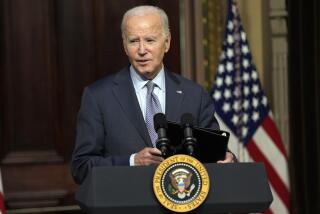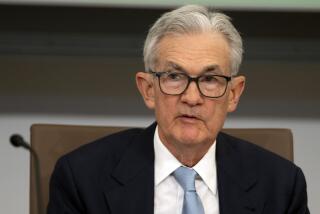Ex-White House economist: ‘Jobs deficit’ needs greater attention
Amid the deficit-cutting fervor that has consumed Washington, Jared Bernstein hopes that the jobless rate isn’t forgotten.
For the Record, 3:11 p.m. May 27: An earlier version of this article incorrectly reported that economist Jared Bernstein said the U.S. should be “going after countries that manage their currency to advantage their experts and disadvantage ours.” Bernstein said “to advantage their exports and disadvantage ours.”
Bernstein is a former top economic advisor to Vice President Joe Biden. Not long ago, he traded his ornate office, complete with fireplace, for more modest digs at a think tank called the Center on Budget and Policy Priorities.
For more than two years, Bernstein was at the center of the economic policy debate inside the Obama administration as the team battled a horrific recession. Over lunch at Union Station on Friday, he talked about unemployment, taxes, the deficit and the controversial stimulus package.
Deficits are dominating the policy discussion in Washington now. But Bernstein said the “jobs deficit” is more worrisome.
“I understand and share the concern about the budget deficit and it makes a lot of sense to plot a sustainable path in that regard,” said Bernstein, a liberal voice in an Obama administration that has veered to the center in the last six months. “But the much more pressing deficit right now is the jobs deficit. The employment rate – the share of the population employed – is still very low. Four points off its peak, which is a ton and not really going anywhere.”
The scarcity of jobs, he said, “hurts in many ways. It hurts in terms of living standards. It throws away productive capacity because people are not able to find gainful work. And, by the way, it makes it harder to lower our deficit and debt because you’re growing more slowly.”
One idea for jumpstarting job growth is expanding U.S. exports by “going after countries that manage their currency to advantage their exports and disadvantage ours,” Bernstein said.
Like China?
“Like China.”
An idea he entertained in his old job was retaining the census workers who were directly employed by the federal government. Once their census work ended, the feds might have redirected them into some other task that would have kept them gainfully employed, he said.
He tells a story of a random email he got from someone who suggested sending the census workers down to the Gulf Coast to clean up the BP oil spill. That idea didn’t make sense, he said, but the concept had merit.
“It got me thinking that we had this large body of people working in these very time-limited jobs,” he said. “And I and my colleagues thought pretty hard about other work that needed to be done that they could do. We never really got far enough with it.”
Bernstein hinted at disagreement with the White House on the issue of tax cuts.
Obama’s view is that the Bush era tax cuts should be allowed to expire for people earning more than $250,000. But the president wants to let the cuts remain in place for those earning less.
Peter Orszag, Obama’s former budget director, said in a speech this week that the tax cuts should be ended for the rich and middle class alike -- a politically risky step, but also an aggressive move toward closing the budget gap.
“Peter’s argument is definitely mathematically correct,” he said.
As for his own position, Bernstein seemed to stake out the space between Orszag and the president. Unlike Orszag, he wouldn’t let the tax cuts expire for hard-pressed families. (“You can’t overlook the economic travails of the middle class,” he said.)
Yet Bernstein appeared open to the idea of ending the tax cuts for at least some upper middle class families earning less than the $250,000 threshold Obama has established.
“Eventually, that kind of conversation needs to occur,” he said tactfully.
Whatever his legacy, Bernstein has a special connection to the $787-billion stimulus package. He and colleague Christina Romer – former chair of the Council of Economic Advisors – wrote a report before Obama took office estimating that the stimulus would cut unemployment more deeply than turned out to be the case.
So, what would Bernstein do differently if he could design the stimulus anew?
“I think I would have de-emphasized some of the tax cuts,” he said. About one-third of the stimulus went toward tax cuts.
He also voiced concerns that certain construction projects underwritten by the stimulus didn’t do enough to put people to work.
“Many projects turned out to be a little more capital intensive than we might have thought, rather than labor intensive. So, instead of 50 guys and 10 machines, you’d have 10 guys and 50 machines.”
Continuing: “I would have tried to do considerably more programs that got closer to direct job creation. This isn’t the FDR New Deal era any more. So it would have been pretty [difficult] to replicate that. But I would have tried to get closer to ideas that more directly create jobs.”
peter.nicholas@latimes.com
More to Read
Start your day right
Sign up for Essential California for news, features and recommendations from the L.A. Times and beyond in your inbox six days a week.
You may occasionally receive promotional content from the Los Angeles Times.






